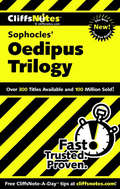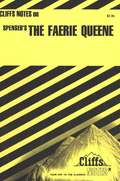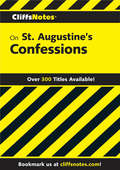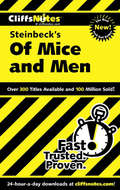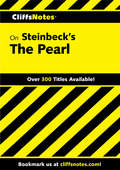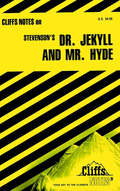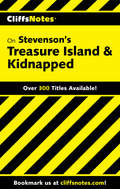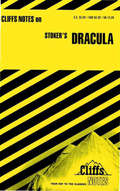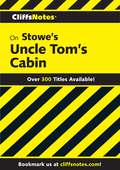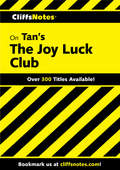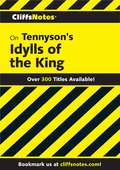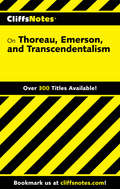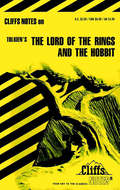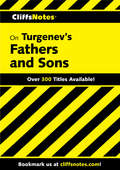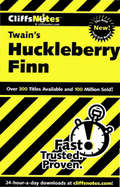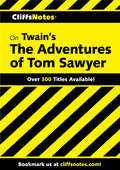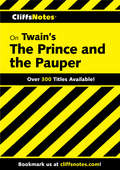- Table View
- List View
CliffsNotes on Sophocles' Oedipus Trilogy
by Regina Higgins Charles HigginsThe original CliffsNotes study guides offer expert commentary on major themes, plots, characters, literary devices, and historical background. The latest generation of titles in this series also feature glossaries and visual elements that complement the classic, familiar format.CliffsNotes on The Oedipus Trilogy is your ticket to a greater understanding of three tragic dramas from Sophocles. Meet the subject of these plays: Oedipus, the banished king of Greek mythology who killed his father and married his mother. Oedipus The King, Oedipus at Colonus, and Antigone are timeless works that continue to captivate audiences even today.This study guide covers all three plays with critical commentaries, summaries, and character analyses -- tools designed to open your eyes to the richness of Sophocles' work. Other features that help you study includeLife and background of the playwright, SophoclesAn introduction to Greek theatreA character map that graphically illustrates the relationships among the charactersCritical essays on fate and ritual and transcendence in the Oedipus TrilogyA review section that tests your knowledgeA Resource Center full of books, films, and Internet sitesClassic literature or modern modern-day treasure -- you'll understand it all with expert information and insight from CliffsNotes study guides.
CliffsNotes on Spenser's The Faerie Queene
by Harold M PriestThis CliffsNotes guide includes everything you've come to expect from the trusted experts at CliffsNotes, including analysis of the most widely read literary works.
CliffsNotes on St. Augustine's Confessions
by Stacy MagedanzThe original CliffsNotes study guides offer expert commentary on major themes, plots, characters, literary devices, and historical background. The latest generation of titles in this series also features glossaries and visual elements that complement the classic, familiar format.CliffsNotes on St. Augustine’s Confessions takes you on a story of conversion – actually several conversions: to Manichaeism; to the pursuit of truth; to an intellectual acceptance of Christianity; and finally to an emotional acceptance of Christian faith. The Confessions is in one sense Augustine’s personal story, but it is also a mythological work about humanity’s quest to discover true peace and satisfaction.Examine the many layers of this masterpiece with help from a study guide you can trust. You'll also gain insight into the background and influences of the author. Other features that help you study include Chapter by chapter summaries and commentariesCritical essaysA review section that tests your knowledgeA Resource Center full of books, articles, films, and Internet sitesClassic literature or modern-day treasure—you'll understand it all with expert information and insight from CliffsNotes study guides.
CliffsNotes on Steinbeck's The Grapes of Wrath
by Kelly M. VlcekThe original CliffsNotes study guides offer a look into key elements and ideas within classic works of literature. The latest generation of titles in this series also features glossaries and visual elements that complement the familiar format.CliffsNotes on The Grapes of Wrath explores John Steinbeck's Pulitzer Prize-winning --and controversial - novel, a work based on the what the author saw for himself as a reporter covering migrant worker camps.Following the story of the Joad family as they travel from the Oklahoma Dust Bowl to California in search of farming opportunities and wealth, this study guide provides summaries and critical commentaries for each part within the novel. Other features that help you figure out this important work includePersonal background on the author, including career highlightsIntroduction to and synopsis of the bookIn-depth character analysesCritical essays to take you into the author's personal philosophyReview section that features interactive questions and suggested essay topics and practice projectsResource Center with books, films, and Web sites that can help round out your knowledgeClassic literature or modern-day treasure -- you'll understand it all with expert information and insight from CliffsNotes study guides.
CliffsNotes on Steinbeck's Of Mice and Men
by Susan Van KirkThe original CliffsNotes study guides offer expert commentary on major themes, plots, characters, literary devices, and historical background. The latest generation of titles in the series also feature glossaries and visual elements that complement the classic, familiar format. In CliffsNotes on Of Mice and Men, you'll meet drifters Lennie and George and recount their peculiar difficulties and unusual bond. The CliffsNotes commentaries, summaries, and character analysis will show you why this sweet, sad, and moving American story is considered to be one of Steinbeck's greatest works. You'll also find Life and background of the author, John Steinbeck A short introduction to the novel A character map that graphically illustrates the relationships among the characters Critical essays A review section that tests your knowledge A Resource Center with books, Web sites, films, and magazine articles for further study Classic literature or modern modern-day treasure - you'll understand it all with expert information and insight from CliffsNotes study guides.
CliffsNotes on Steinbeck's The Pearl (Cliffsnotes Ser.cliffs Notes Series)
by Eva FitzwaterThe original CliffsNotes study guides offer expert commentary on major themes, plots, characters, literary devices, and historical background. The latest generation of titles in this series also feature glossaries and visual elements that complement the classic, familiar format.In CliffsNotes on Steinbeck's The Pearl, you’ll meet a simple family brought to a tragic end. Their pearl is supposed to bring their child out of darkness; he will be able to learn to read and write, and he will then be able to help all of the natives. Instead, the pearl becomes the direct instrument of the child’s death.This concise supplement to Steinbeck's The Pearl helps you appreciate the novel on an aesthetic, ecological, or sociological vein. Features that help you study include Chapter-by-chapter summaries and commentariesA list of characters and analyses of the major playersLife and background of the author, John SteinbeckA Critical approach to the novelA review section that tests your knowledgeA selected bibliographyClassic literature or modern-day treasure—you'll understand it all with expert information and insight from CliffsNotes study guides.
CliffsNotes on Steinbeck's The Red Pony, Chrysanthemums, and Flight
by Gary K Carey John G. IronsThis CliffsNotes guide includes everything you’ve come to expect from the trusted experts at CliffsNotes, including analysis of the most widely read literary works.
CliffsNotes on Stendhal's The Red and the Black
by D. L. GobertThis CliffsNotes guide includes everything you’ve come to expect from the trusted experts at CliffsNotes, including analysis of the most widely read literary works.
CliffsNotes on Stevenson's Dr. Jekyll and Mr. Hyde
by James L RobertsThe original CliffsNotes study guides offer a look into critical elements and ideas within classic works of literature. CliffsNotes on Dr. Jekyll and Mr. Hyde explores the double life of a man whose persona swings from honorable and distinguished to repugnant and repulsive. Following a fascinating character study, this study guide provides summaries and commentaries for each chapter within the nineteenth-century novel. Other features that help you figure out this important work include A look into the life of the author, Robert Louis Balfour Stevenson Character list and expanded analysis Plot summary that shares an overview of the novel Review questions and suggested essay topics Selected bibliography Classic literature or modern-day treasure -- you'll understand it all with expert information and insight from CliffsNotes study guides.
CliffsNotes on Stevenson's Treasure Island & Kidnapped (Cliffsnotes Ser.cliffs Notes Series)
by Gary K CareyThese novels of pirates on the high seas and intrigue in the Scottish highlands were written on a challenge by Stevenson's teenage stepson to "write something really interesting." The results are these fast-moving and adventurous books, simple and entertaining.
CliffsNotes on Stoker's Dracula
by Samuel J UmlandThe original CliffsNotes study guides offer a look into critical elements and ideas within classic works of literature. The latest generation of titles in this series also features glossaries and visual elements that complement the classic, familiar format. CliffsNotes on Dracula digs into the story of a count who survives by sipping the blood from living (and unsuspecting) donors. Following the hauntingly frightful tale of vampires and victims, this study guide provides summaries and commentaries for each chapter within the nineteenth-century novel. Other features that help you figure out this important work include A look into the life of the author, Bram Stoker Character list and plot synopsis An essay exploring the influence of German Expressionism on the American horror film A list of Dracula film productions, with ratings for each Suggested discussion questions Classic literature or modern-day treasure -- you'll understand it all with expert information and insight from CliffsNotes study guides.
CliffsNotes on Stowe's Uncle Tom's Cabin (Cliffsnotes Ser.)
by Mary Thornburg Thomas ThornburgThe original CliffsNotes study guides offer expert commentary on major themes, plots, characters, literary devices, and historical background. The latest generation of titles in this series also feature glossaries and visual elements that complement the classic, familiar format.In CliffsNotes on Uncle Tom's Cabin, you discover Harriet Beecher Stowe's most memorable and socially relevant novel—a book that, when published in 1852, galvanized public opinion against slavery in a way never seen before. The story follows the lives of two slaves: Eliza, who escapes slavery with her son, and Tom, who must endure humiliation, abuse, and torture inflicted by his owners.This study guide takes you though Eliza and Tom's journeys by providing summaries and commentaries on each chapter of the novel. Critical essays give you insight into the major themes of the novel, as well as the novel's structure and Gothic elements. Other features that help you study includeCharacter analyses of the main charactersA character map that graphically illustrates the relationships among the charactersA section on the life and background of Harriet Beecher StoweA review section that tests your knowledgeA Resource Center full of books, articles, films, and Internet sitesClassic literature or modern-day treasure—you'll understand it all with expert information and insight from CliffsNotes study guides.
CliffsNotes on Swift's Gulliver's Travels
by A. Lewis Soens Jr. Patrick J. SalernoThis CliffsNotes guide includes everything you’ve come to expect from the trusted experts at CliffsNotes, including analysis of the most widely read literary works.
CliffsNotes on Tan's The Joy Luck Club
by Laurie Neu RozakisThe original CliffsNotes study guides offer expert commentary on major themes, plots, characters, literary devices, and historical background. The latest generation of titles in this series also feature glossaries and visual elements that complement the classic, familiar format.Explore how generational and cultural differences can divide — and then unite — immigrant mothers and their American-born daughters as you study CliffsNotes on The Joy Luck Club.This novel describes the lives of four women, who fled China in the 1940s, and their contentious relationships with their four very Americanized daughters. Through the love of their mothers, each of these young women learns about her heritage and so is able to deal more effectively with her life.CliffsNotes provides detailed plot summaries, critical commentaries, and a helpful character list to help you uncover all the insight this novel has to offer. Make studying easier with CliffsNotes on The Joy Luck Club. Other features includeCritical essaysA review section that tests your knowledgeBackground on the author, including career highlightsClassic literature or modern modern-day treasure — you'll understand it all with expert information and insight from CliffsNotes study guides.
CliffsNotes on Tan's The Kitchen God's Wife
by Mei Li RobinsonThis CliffsNotes guide includes everything you’ve come to expect from the trusted experts at CliffsNotes, including analysis of the most widely read literary works.
CliffsNotes on Tartt's The Goldfinch
by Abigail WheetleyCliffsNotes on Donna Tartt's The Goldfinch, winner of the 2014 Pulitzer Prize for Fiction, includes everything you've come to expect from the trusted experts at CliffsNotes, including summaries and analyses of Tartt's sprawling novel. Features of this Lit Note includeFocused summaries of the plot and analysis of important themes, symbols, and character developmentCharacter analyses of major characters, focusing on what motivates each characterBrief synopsis of the novelShort quiz
CliffsNotes on Tennyson's Idylls of the King
by Robert J MilchThis CliffsNotes guide includes everything you’ve come to expect from the trusted experts at CliffsNotes, including analysis of the most widely read literary works.
CliffsNotes on Thoreau, Emerson, and Transcendentalism
by Leslie P WilsonThe original CliffsNotes study guides offer expert commentary on major themes, plots, characters, literary devices, and historical background. The latest generation of titles in this series also feature glossaries and visual elements that complement the classic, familiar format.CliffsNotes on Thoreau, Emerson, and Transcendentalism explores in depth, but also in easy-to-understand terms, transcendentalism—the religious, political, and literary movement that captured the minds of such literary figures as Henry David Thoreau and Ralph Waldo Emerson in the first half of the 19th century. This guide helps you to understand the various tenets of transcendentalism, as well as how Thoreau and Emerson became the two most well-known figures associated with the movement and how the transcendentalist philosophy is reflected in their work.In addition to introducing you to the basics of understanding transcendentalism, this guide also gives you the following:Examinations of the lives of Thoreau and EmersonDetailed summaries of and commentaries on many of their transcendentalist writings, such as Emerson's Nature and Thoreau's WaldenCritical essays on Emerson and Thoreau's reputation and influenceA review section that tests your knowledgeA Resource Center full of books, articles, and Internet sitesClassic literature or modern-day treasure—you'll understand it all with expert information and insight from CliffsNotes study guides.
CliffsNotes on Thoreau's Walden (Cliffs Notes Series)
by Joseph R McElrathThe original CliffsNotes study guides offer expert commentary on major themes, plots, characters, literary devices, and historical background. The latest generation of titles in this series also feature glossaries and visual elements that complement the classic, familiar format.In CliffsNotes on Walden, you discover the most important work of Henry David Thoreau—his exploration of the transcendentalist's striving to realize the possibility of one's own perfection and divinity. What results is an account of Thoreau's two-year stay at Walden Pond, as he celebrates nature as he moves toward spiritual rebirth and fulfillment.Chapter summaries and commentaries take you through Thoreau's journey, and essays help you understand the Transcendentalist movement and Thoreau's place in it. Other features that help you study includeA section on the life and background of Henry David ThoreauA section of essay questions and theme topicsA selected bibliographyClassic literature or modern-day treasure—you'll understand it all with expert information and insight from CliffsNotes study guides.
CliffsNotes on Tolkien's The Lord of the Rings & The Hobbit
by Gene B HardyJoin the journey through Middle-earth in the study guide of these two epic fantasies suggestive of life in medieval days, a classical battle between good and evil and the quest for a magical ring. This guide covers all four volumes of this unforgettable fantasy.
CliffsNotes on Turgenev's Fathers and Sons
by Denis M. CalandraThe CliffsNotes study guide on Turgenev's Fathers and Sons supplements the original literary work, giving you background information about the author, an introduction to the work, a graphical character map, critical commentaries, expanded glossaries, and a comprehensive index, all for you to use as an educational tool that will allow you to better understand the work. This study guide was written with the assumption that you have read Fathers and Sons. Reading a literary work doesn't mean that you immediately grasp the major themes and devices used by the author; this study guide will help supplement your reading to be sure you get all you can from Turgenev's Fathers and Sons. CliffsNotes Review tests your comprehension of the original text and reinforces learning with questions and answers, practice projects, and more. For further information on Turgenev's Fathers and Sons, check out the CliffsNotes Resource Center at www.cliffsnotes.com.
CliffsNotes on Twain's The Adventures of Huckleberry Finn
by Robert BruceThe original CliffsNotes study guides offer expert commentary on major themes, plots, characters, literary devices, and historical background. The latest generation of titles in this series also feature glossaries and visual elements that complement the classic, familiar format. In CliffsNotes on Huckleberry Finn, you follow the Mississippi River adventures of Mark Twain's mischief-making protagonist Huck Finn and the runaway slave Jim. Just like Huck's makeshift raft, this study guide carries you along on his incredible journey by providing chapter summaries and critical analyses on life in the late-19th-century American south. You'll also gain insight into the man behind this American classic -- Mark Twain, a.k.a. Samuel Clemens. Other features that help you study include Character analyses of major players A character map that graphically illustrates the relationships among the characters Critical essays A review section that tests your knowledge A Resource Center full of books, articles, films, and Internet sites Classic literature or modern modern-day treasure -- you'll understand it all with expert information and insight from CliffsNotes study guides.
CliffsNotes on Twain's The Adventures of Tom Sawyer
by James L RobertsThe original CliffsNotes study guides offer expert commentary on major themes, plots, characters, literary devices, and historical background. The latest generation of titles in this series also feature glossaries and visual elements that complement the classic, familiar format.In CliffsNotes on The Adventures of Tom Sawyer, you experience the exciting adventures of a typical boy during the mid-nineteenth century. The characters—Tom himself, Becky Thatcher, Huck Finn, Injun Joe, and Aunt Polly—have become part of American heritage.Use this study guide to help you discover all of Tom’s dreams and fears—and perhaps a few of your own! You'll also gain insight into the man behind this American classic—Mark Twain, a.k.a. Samuel Clemens. Other features that help you study include Character analyses of major playersA character map that graphically illustrates the relationships among the charactersCritical essaysA review section that tests your knowledgeA Resource Center full of books, articles, films, and Internet sitesClassic literature or modern-day treasure—you'll understand it all with expert information and insight from CliffsNotes study guides.
CliffsNotes on Twain's The Prince and the Pauper
by L. David Allen James L. RobertsThe CliffsNotes study guide on Twain's The Prince and the Pauper supplements the original literary work, giving you background information about the author, an introduction to the work, a graphical character map, critical commentaries, expanded glossaries, and a comprehensive index, all for you to use as an educational tool that will allow you to better understand the work. This study guide was written with the assumption that you have read The Prince and the Pauper. Reading a literary work doesn’t mean that you immediately grasp the major themes and devices used by the author; this study guide will help supplement your reading to be sure you get all you can from Twain's The Prince and the Pauper. CliffsNotes Review tests your comprehension of the original text and reinforces learning with questions and answers, practice projects, and more. For further information on Twain's The Prince and the Pauper, check out the CliffsNotes Resource Center at www.cliffsnotes.com.
CliffsNotes on Virgil's Aeneid
by Suzanne Pavlos Richard McdougallThe original CliffsNotes study guides offer expert commentary on major themes, plots, characters, literary devices, and historical background. The latest generation of titles in this series also features glossaries and visual elements that complement the classic, familiar format.CliffsNotes on Aeneid takes you on the journey of a band of survivors who leave their destroyed city to seek another home in a faraway country. Woven from myth and legend, the story is about rebirth, about life springing forth from ruin and death.This study guide will help navigate the voyages of the Trojans and uncover their significance in Virgil's time and today. You'll also gain insight into the life and cultural background of the author. Other features that help you study includeCharacter analyses of major playersA character map that graphically illustrates the relationships among the charactersCritical essaysA review section that tests your knowledgeA Resource Center full of books, articles, films, and Internet sitesClassic literature or modern modern-day treasure -- you'll understand it all with expert information and insight from CliffsNotes study guides.
